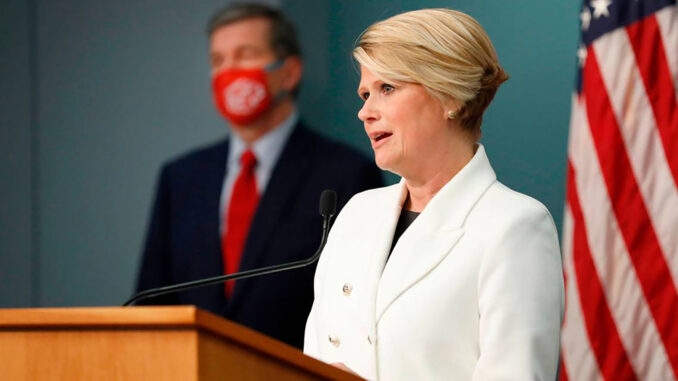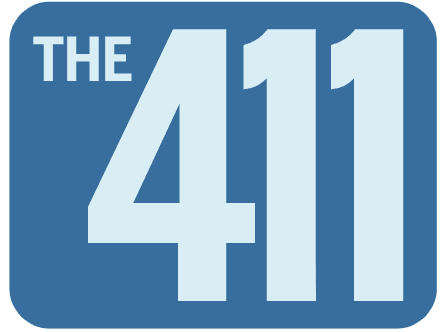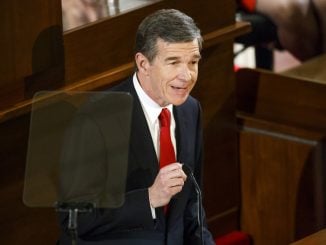
RALEIGH — The second annual North Carolina Coalition for Charter Schools summit held in Raleigh earlier this month was attended by more than 200 charter leaders, stakeholders, lawmakers, industry experts and professionals in attendance.
“This is our second charter summit and we’re just getting better every year,” North Carolina Coalition for Charter Schools (NCCCS) President Lindalyn Kakadelis told North State Journal. “I can’t wait even for next year, but we’re thankful for the 99 schools that came, and hopefully we can give them a real flavor of what the politics around charter schools is.”

North Carolina currently has 210 public charter schools across 63 counties with 145,593 students enrolled and more than 85,000 on waitlists. Charter schools are public schools and, like their district counterparts, funded on a per-pupil basis. However, unlike district schools, charter schools receive no state, lottery or school bond funds to pay for their facilities.
The summit kicked off with a March 7 reception honoring State Superintendent Catherine Truitt.
Kakadelis, NCCCS Board Vice-Chair Sandeep Aggarwal and Jonathan Bryant presented Truitt with a leadership award for her work supporting public charter schools.
“I am so excited to be here with my people, the charter school people,” Truitt said in her opening remarks.
In her remarks, Truitt noted how charter schools had kept their doors open during the pandemic, oftentimes “at a loss,” and showed parents how important charter schools are in North Carolina. She added that around 10% of students in the state attend a charter school.
“I am so incredibly proud of what this community did in order to help students recover from the pandemic more quickly than students who were shut out of their schools for longer,” said Truitt. “It was clear then, as it is now, that the opportunity to have choice in where a child goes to school, as well as choice in a method that your child best learns, are the greatest equalizers for parents and children.
“And there are absolutely forces in our state that want to take that choice away from you. And we are in a battle of philosophies between funding buildings and funding students … funding the system or funding students. And if we’re not careful, we are going to lose that battle.”
Truitt also spoke about recent legislation such as the charter school omnibus and the new law establishing the Charter School Review Board (CSRB), which she said took “the politics out of approving and denying charter schools by providing charter school experts with the ability to vet schools.”
During the Match 8 welcome breakfast at the summit, attendees watched a surprise video message from Democratic Gov. Roy Cooper.
In the 50-second video, Cooper congratulated the NCCCS on holding its second annual summit and tied in his “Year of the Public Schools” proclamation.
“I declared 2024 as the Year of Public Schools in North Carolina to celebrate the amazing things happening there, including our public charter schools, which serve thousands of students across our state,” said Cooper. “North Carolina Public Charter schools offer a variety of educational opportunities for students and families and help ensure our students are prepared for the future. The future of our state goes to public school every single day, and we have to make sure we invest in that future.”
Cooper went on to thank the charter school community for all the “good work you do.”
Following the governor’s message, the day started with remarks on charter funding and growth given by state Sen. Amy Galey (R-Alamance), the chair of the Senate Appropriations on Education/Higher Education and Education/Higher Education Committees.
The lunch keynote speaker was Jeanne Allen, founder & CEO of the Center for Education Reform. Allen’s remarks centered on the power of advocacy in charter school growth and on her work on the Yass Price, often referred to as the “Pulitzer of Education.”
Other discussion panels followed, including topics such as the new CSRB, polling data and misconceptions about charters, construction of new schools, understanding state and local funding, as well as school safety, facility funding, and discussions about advocacy, lobbying and politics.
The CSRB panel included the new board’s Chair Bruce Friend, Vice-Chair John Eldridge, as well as Ashley Baquero, director of the Office of Charter Schools at the Department of Public Instruction.
At the beginning of the panel’s discussions, Friend highlighted Cooper’s veto message — the state’s Republican supermajority overturned the governor’s veto — on the CSRB bill in which he stated, “Oversight of charter schools should be conducted by education experts, not partisan politicians.”
“I carried that (press release) with me because it serves as a reminder of how important this work is and how important it is for us to get this work right,” said Friend. “On the CSRB, make no mistake, present self-excluded, are education experts.
“(They are) people who take the time and read every page of that 500-page application, who have the experience of being teachers and school leaders, heads of school, expertise in finance and facilities work, and I can go on and on.”
The panel also addressed the attempt made last September by the N.C. State Board of Education to control the charter school authorization process by threatening funding. The proposed policy was quickly extinguished by the legislature with language added to the 2023 budget barring such a move.
The majority of current state Board of Education members are Cooper appointees.
Another presentation that drew a crowd was “The Democratic Perspective on Charter Schools,” given by senior state Sen. Mike Woodard (D-Durham), which delved into a “path forward” on how to work with Democratic legislators.
“It’s sad to me about how partisan some of these things have become, and particularly when we talk about charter schools,” said Woodard, who sat on the board of a charter school for three years and tutors at a Title I school.
He added he was one of two incumbent Democrats to lose their primary races on March 5, and he believes his support of charter schools was a factor.
“Frankly, it’s become very hard for Democrats to support charter schools — that’s just the fact — or even work with the charter schools in their community,” said Woodard. “And Democrats who do work with their charter schools often pay a price. I lost my primary on Tuesday, and my work with the charters in my community was one of the issues that was used against me in the primary.”
Woodard mentioned Reps. Cecil Brockman (D-Guilford), who staved off his challenger, and Michael Wray (D-Northampton), who was defeated, as “been good friends of charter schools as well.”
“They’re not going anywhere,” “Woodard said of charter schools. “We’re not going to get rid of them anytime soon, and they are providing, in the vast majority of cases, really good educational opportunities for our constituent families.”
Woodard said charter schools are growing in urban and suburban areas where the population often votes Democrat, making it essential that both sides of the political spectrum work together.
“Even when we see registrations change and move unaffiliated, we’re seeing more and more of these counties vote Democratic. They’re turning very, very blue,” said Woodard, later adding that the voting pattern is spreading to neighboring counties.
“My point is that you’re going to have to find that you’re going to have to work with these Democrats more and more,” said Woodard. “Just as charter schools are here to stay, the Democrats in those communities are there to stay.”
He added that his race was representative that charter schools would see more Democrats in the future, and he thinks that will be a challenge “politically” for charter schools as they move forward.
Woodard urged attendees to not only engage Democrat elected officials, both at the local and state levels, by inviting them to their school and regularly talking to them but also to support them when they work to aid charter schools.
In an interview with North State Journal following his remarks, Woodard underscored the politicization of charter schools as a challenge Democrats face in supporting those schools as well as a “lack of knowledge.”
“I’m not sure that a lot of folks in my in the Democratic caucuses have spent time with charter schools and understanding what they do and what role they play in their community,” said Woodard. “So it starts there, I think, and the politicization of charters and their role in the community too; that it’s become a very political hot button and is used often against Democrats.”
Woodard said he is focused on items coming up in the legislature’s short session but has had conversations about his future.
“But I’m not going away or fading that into the woodwork,” said Woodward. “Public policy and public service has been something that I’ve dedicated my adult life to, so I’m going to continue serving just to find you what the next step is.”



